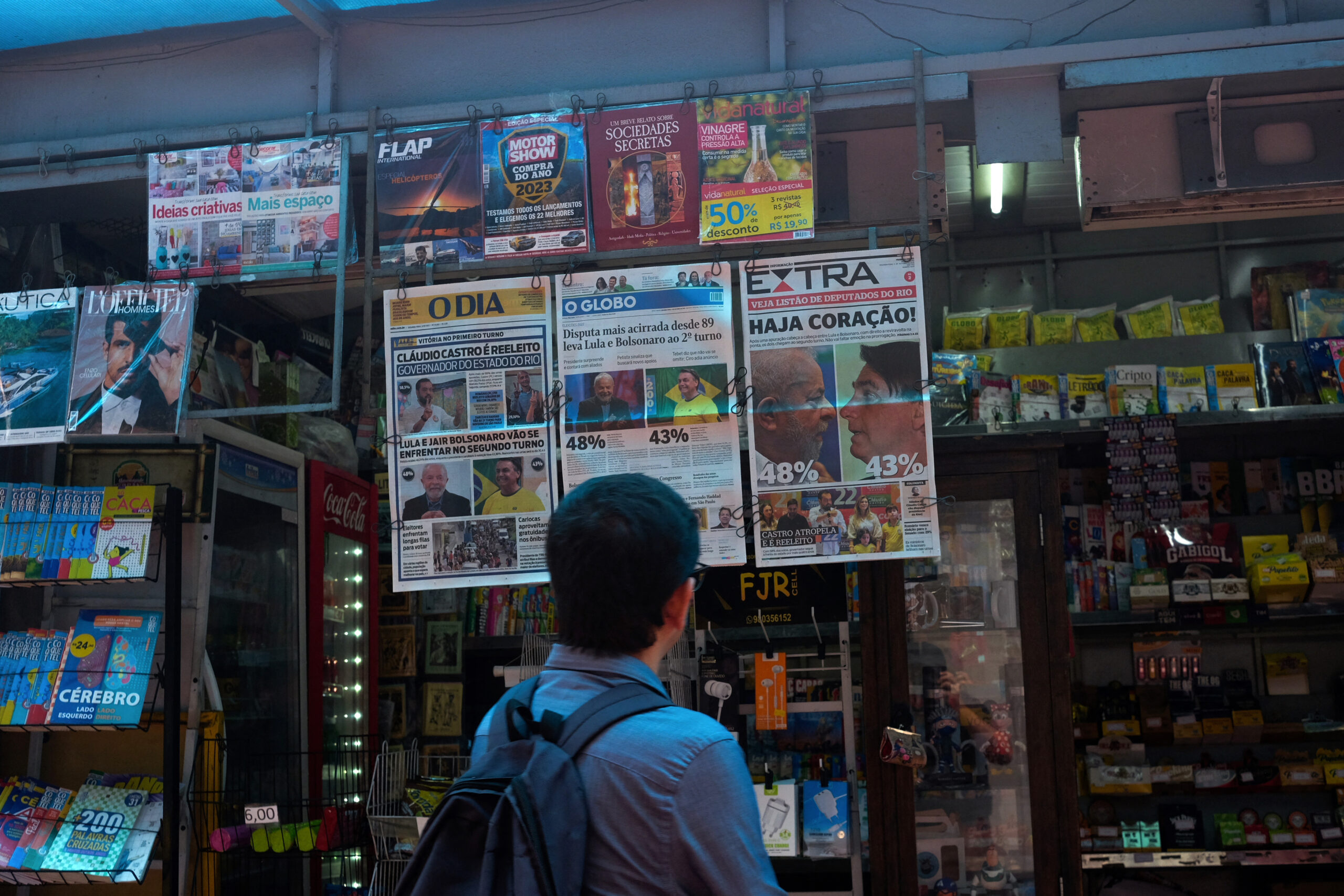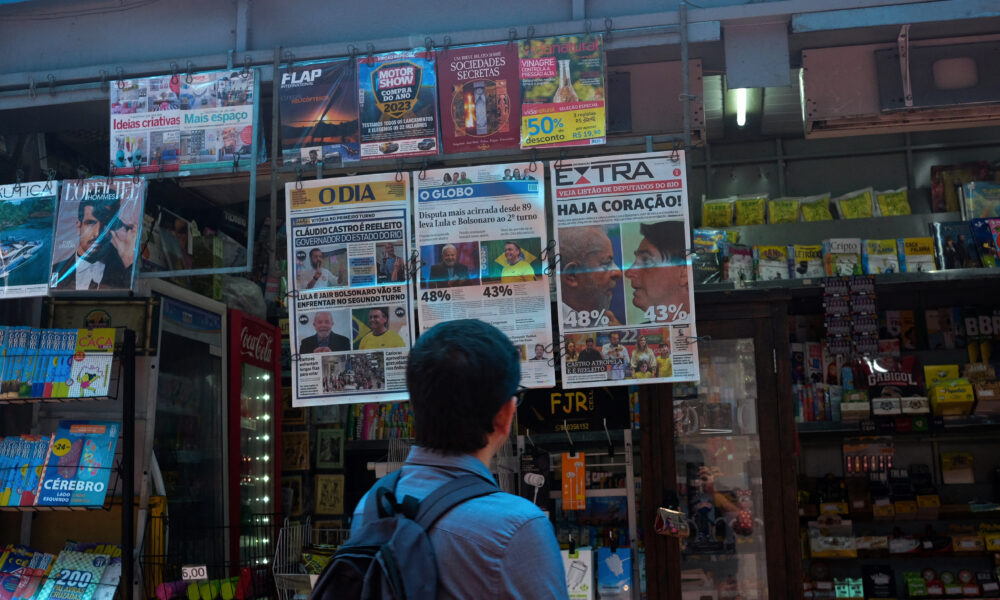International
Inconclusive vote: Brazil wakes up to four more weeks of uncertainty

AFP | Mariëtte Le Roux
After an inconclusive first round of presidential elections, Brazilians woke up Monday to another month of uncertainty in a deeply polarized political environment and with renewed fears of unrest.
Seeking to make a spectacular comeback, ex-president and frontrunner Luiz Inacio Lula da Silva, 76, failed to garner the 50 percent of votes plus one needed to avoid an October 30 runoff against far-right incumbent Jair Bolsonaro, 67.
Lula got 48.4 percent of the vote in Sunday’s first round, followed by Bolsonaro with a much closer-than-expected 43.2 percent that seemed to signal a high level of enthusiasm for his conservative brand of “God, country and family” politics.
Lula had gone into Sunday’s first round with 50 percent of polled voter intention, and Bolsonaro with 36 percent.
The divisive president’s surprise performance likely spells a difficult time ahead, analysts said.
“I think it will be a very stressful campaign,” Leonardo Paz, Brazil consultant for the International Crisis Group, told AFP.
“Bolsonaro and Lula will come… for each other, and I think Bolsonaro will double down on… saying that the system was against him.”
Bolsonaro has repeatedly sought to cast doubt on Brazil’s electronic voting system and has questioned the validity of opinion polls that have consistently placed him a distant second.
Now, with real-life results seeming to bear out his claims, “more people… may believe in what Bolsonaro is saying,” said Paz.
‘Emboldened’
The incumbent president has repeatedly hinted that he would not accept a Lula victory, raising fears of a Brazilian version of the riots last year at the US Capitol after former president Donald Trump refused to accept his election loss.
Bolsonaro “will be very emboldened,” by Sunday’s electoral performance, said Michael Shifter of the Inter-American Dialogue think tank.
“It will give him some momentum because he’s beaten the expectations… He will play on that the experts were wrong: ‘I’ve got the momentum and I’ll defy expectations again in the second round’.”
Late Sunday, Bolsonaro proclaimed to journalists: “We defeated the opinion polls’ lie.”
Passions will be high on both sides for the next four weeks.
Lula’s failure to pull off a first-round victory leaves Bolsonaro with “an extra month to cause turmoil in the streets,” political scientist Guilherme Casaroes of the Getulio Vargas Foundation’s (FGV) Sao Paulo School of Business Administration told AFP.
“Any kind of doubt that he casts upon the electoral system will work in his favor… demobilizing voters not to go vote for Lula.”
This would mean hammering on Lula’s flaws, including his controversial conviction for corruption — since overturned in court, but not necessarily in the court of public opinion — and the 18 months he spent in jail.
“Certainly he (Bolsonaro) is very capable of revving up his base and they could interpret that (as the all-clear) to go after Lula supporters… You can’t rule it out,” said Shifter.
“There’s just a lot of rancor and a lot of hate and a lot of distrust and it would not be surprising if some of that leads to some unrest,” he added.
Any violence, however, was likely to be in the form of isolated incidents and not organized, just like it has been so far, analysts said.
Headed for an upset?
Sunday’s election outcome also suggested Bolsonaro cannot be written off.
“Lula’s chances of being elected seem considerably slighter,” said Casaroes.
A ‘Bolsonarist’ wave energized by the first-round results “will boost the president’s campaign and may help demobilize the non-convinced voters of Lula.”
It also means Lula will have to “court centrists and even conservatives much more aggressively during the next four weeks,” said the FGV’s Oliver Stuenkel, possibly hurting his standing with more radical leftist supporters.
Conversely, the disappointing result for Lula supporters might also serve to fire them up ahead of the next round.
“People that perhaps did not… vote because they thought that Bolsonaro would lose… they might go” vote in the next round, said Paz.
Added Casaroes: “Those who really care for democracy in the country will have to get off the couch. Occupying the public space against a strengthened Bolsonarism may be difficult, but it is the only way to prevent Bolsonaro’s long-run authoritarian project from consolidating at all levels.”
International
Claudia Sheinbaum: Operation Against ‘El Mencho’ Was Based on Pending Arrest Warrants

Mexico’s President Claudia Sheinbaum on Wednesday rejected claims that the military operation that resulted in the death of Nemesio Oseguera Cervantes, known as “El Mencho,” leader of the Jalisco New Generation Cartel (CJNG), was carried out under pressure from the United States government.
Sheinbaum explained that the deployment of federal forces was aimed at executing outstanding arrest warrants against Oseguera Cervantes, who was considered one of the most wanted criminals in both Mexico and the United States.
“That was not the objective (to ease pressure from the United States). It is very important, and I want to repeat it. This individual had an arrest warrant, or several,” Sheinbaum said, referring to the operation conducted on February 22.
According to the president, the initial goal was to capture Oseguera Cervantes, but military forces responded after coming under attack during the intervention.
“The operation was to detain him. The problem is that they were attacked — the Secretariat of National Defense — and they responded at that moment,” she said.
The president insisted that the action was not carried out in response to external demands, although she acknowledged intelligence cooperation with the United States.
“It was not done in any way because of pressure from the United States, not at all. Of course, there was intelligence information from the United States that was used specifically,” she concluded.
International
Spain Denies Any Agreement to Cooperate with U.S. Military in Iran Operations
International
White House Says Spain Agrees to Cooperate with U.S. Military After Trump Threatens Trade Embargo

White House Press Secretary Karoline Leavitt said Wednesday that Spain has agreed “in recent hours” to cooperate with the U.S. military, following President Donald Trump’s threat to impose a trade embargo on Madrid.
Trump had warned of potential commercial measures after Spain reportedly refused to allow the Pentagon to use facilities at Spanish military bases for operations related to Iran.
“With respect to Spain, I think you heard the president’s message yesterday loud and clear, and I understand that in recent hours they have agreed to cooperate with the United States military,” Leavitt said during a press briefing.
She added that the U.S. military is currently coordinating with its counterparts in Spain. However, the president expects broader support.
“The president expects that all of Europe, all of our European allies, of course, will cooperate in this important mission — not only for the United States, but also for Europe,” Leavitt said.
Her remarks came in response to questions about Spain’s position and its role as a U.S. ally amid rising tensions surrounding operations involving Iran.
-

 International4 days ago
International4 days agoIran Reports 201 Dead, 747 Injured After U.S. and Israeli Strikes
-

 International3 days ago
International3 days agoBrazil’s Supreme Court Rejects Bolsonaro’s Bid for House Arrest
-

 International3 days ago
International3 days agoAnti-ICE Billboard Campaign Targets Immigration Spending in 31 U.S. Cities
-

 International4 days ago
International4 days agoPope Leo XIV Urges End to ‘Spiral of Violence’ in Middle East
-

 Sin categoría5 days ago
Sin categoría5 days agoTrump: ‘We Think It’s True’ Amid Claims Iran’s Supreme Leader Was Killed
-

 International2 days ago
International2 days agoSpain’s Prime Minister to Address Nation Amid Trump’s Trade Threats
-

 International5 days ago
International5 days agoSecurity Council to Hold Emergency Meeting on Middle East Crisis
-

 International3 days ago
International3 days agoTrump Warns of ‘Major Wave’ of Attacks as Iran Conflict Escalates
-

 International20 hours ago
International20 hours agoWhite House Says Spain Agrees to Cooperate with U.S. Military After Trump Threatens Trade Embargo
-

 International3 days ago
International3 days agoMexico Calls for Immediate Probe After National Dies in ICE Custody
-

 International2 days ago
International2 days agoNew York Announces First 2,000 Seats in Universal 2-K Program
-

 International20 hours ago
International20 hours agoSpain Denies Any Agreement to Cooperate with U.S. Military in Iran Operations
-

 International3 days ago
International3 days agoBolivia Orders Three Investigations Into Deadly Military Plane Crash
-

 Central America20 hours ago
Central America20 hours agoNicaragua Held Responsible for Harassment of Opposition Prosecutor and His Family
-

 International2 days ago
International2 days agoWarner Bros. Developing First ‘Game of Thrones’ Movie With ‘Andor’ Writer
-

 Central America3 days ago
Central America3 days agoPanama Canal Monitoring Trade as Middle East Conflict Disrupts Shipping
-

 Central America2 days ago
Central America2 days agoGuatemala’s Attorney General Fails in Bid for Top Court Seat Amid Corruption Allegations
-

 International20 hours ago
International20 hours agoClaudia Sheinbaum: Operation Against ‘El Mencho’ Was Based on Pending Arrest Warrants































